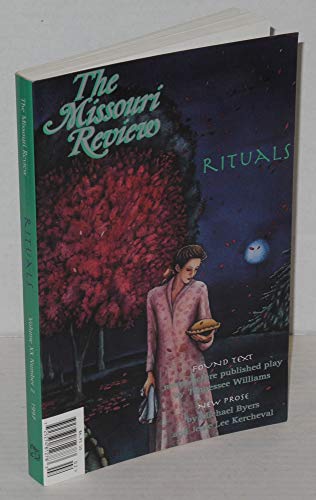Articoli correlati a The Missouri Review

At the heart of the issue, though, are two essays that are of a kind: William Holtz's memoir of a father ill-equipped to be a provider, and Ron Johnson's of his resilient, hard-working mother. Holtz and Johnson have pulled off a noteworthy feat in writing interestingly and significantly about their respective parents. Callous as it sounds to say so, most of the "I remember Mama (Daddy)" essays that I see among our submissions are like snapshots of one's kids: somewhat tedious and unfocused. What Holtz and Johnson give us are, on the one hand vital portraits, drawn with sympathy and precision; (I'm tempted to say "characters," so fully do they come alive on the page). Holtz's essay is additionally memorable because it depicts, albeit with some humor, the impact of America's most severe economic tragedy. The Depression shattered careers, wrenched families, changed lives, as we can't help but recall when we read the author's account of how his family struggled through its aftermath. Johnson's essay, from his book in progress about laboring people, describes the perennial hardship of blue-collar workers. Yet it was through such work, hoeing mint, that Johnson's mother, until then a housewife, came into her own and became a real person to her husband and children. Supporting her family gave her confidence and an identity beyond that of wife and mother (even earned her the right to make off-color jokes). In the end, one of the larger points to be gleaned from Johnson's essay is that in our capitalist society, legitimacy--humanness, in effect--is granted mainly to those individuals, whether men or women, who draw paychecks.
The memoir--nonfiction in general--is hot these days, and that trend is reflected in the number of writing programs and workshops and institutes that are adding "creative nonfiction" to their curricula. In part this may be the result of the market being so saturated with fiction. But also it seems to reflect the genuine (not lip-service) interest many readers have now in learning about experiences that are different from their own. Is it linked to another trend we've been noticing--the increased number of good fiction writers who are working in the first person?
Now, it's a commonplace that, in fiction, especially, the first-person is the mark of a beginner. At its worst, "I" can become simply a mushy, ill-defined vehicle for the author's confessions. But we can all rattle off numerous exceptions without any trouble: Dickens, Twain, Charlotte Bront, Mary Shelley; more recently Salinger and Penn Warren; more recently still Louise Erdrich, Fay Weldon, Raymond Carver, Robert Olen Butler, Margaret Atwood. Ventriloquists all, whose vivid first-person creations prove that in skilled hands, "I" has an authority and authenticity that are hard to equal: how can we doubt the (ostensibly) literal voice of experience?
In this issue we present, unapologetically, a host of first-person speakers, from Anthony Burke Lee's naively philosophical ex-con to Jamie Callan's neurotic D-girl to the "silent" letter-writers of Deena Linnet's epistolary poems.
Le informazioni nella sezione "Riassunto" possono far riferimento a edizioni diverse di questo titolo.
This issue inaugurates our twentieth year. Happy Birthday to us! We hope you'll still be reading MR twenty years from now. It also comes on the one-year anniversary of a sad event: the death of our co-founder, Larry Levis, an extraordinary poet and teacher, who together with his former wife, Marcia Southwick Gell-Mann, established the magazine in 1978. To commemorate Larry, our Editors' Prize in poetry will become the Larry Levis Editors' Prize in poetry beginning next January. It's our hope that the prestige of the prize, and the increased cash award of $1,500 will help promote new poets and recognize Larry's lifetime commitment--and our continuing one--to poetry.
Also in the spirit of poetry, we're pleased to introduce you, in this issue, to the sharp-edged and nimble poetry of Laura Henrikson, our newest McAfee Discovery Feature poet.
Finally, we understand that congratulations are in order to two writers whose work previously appeared in the magazine: Dwight Allen, whose story, "The Green Suit" (19.2) has been chosen to appear in this year's NEW STORIES FROM THE SOUTH, and Wally Lamb, whose first published piece of fiction--for which he won our Peden Prize--became part of his novel, SHE'S COME UNDONE, a runaway best-seller and an Oprah Book Club selection. Toc: EDITOR'S PRIZE WINNERS Fiction Anne Miano - The Oboist Poetry William Greenway Essay Ron Johnson -- Women's Work: A Memoir FICTION Anthony Burke Lee - Butterfly's Cutlass Supreme Jamie Callan - I Do Believe in Ghosts, I Do, I Do, I Do Willoughby Johnson - E-Z Roll G.K. Wuori - Digby Fair William Harrison - Two Cars in a Cornfield INTERVIEW Russel Ingram & Mark Ledbetter - An Interview with Lewis Nordan POETRY Walter Bergen THE TOM McAFEE DISCOVERY FEATURE Laura Henrikson Deena Linett ESSAY William Holtz - Two Fingers BOOK REVIEWS
Le informazioni nella sezione "Su questo libro" possono far riferimento a edizioni diverse di questo titolo.
- EditoreThe Curators of the University of Missouri
- Data di pubblicazione1997
- ISBN 10 1879758199
- ISBN 13 9781879758193
- RilegaturaPaperback
- Numero edizione1
- Numero di pagine208
- RedattoreMorgan Speer, Michalson Greg, Somers Evelyn
- DisegnatoreCable Carole
Compra usato
Condizioni: molto buonoPrompt shipment, with tracking.... Scopri di più su questo articolo
Spese di spedizione:
EUR 6,54
In U.S.A.
I migliori risultati di ricerca su AbeBooks
The Missouri Review
Descrizione libro Condizione: Very Good. Cable, Carole (illustratore). Prompt shipment, with tracking. we ship in CLEAN SECURE BOXES NEW BOXES Very good. Few creases. *. Codice articolo ware72kr4375

